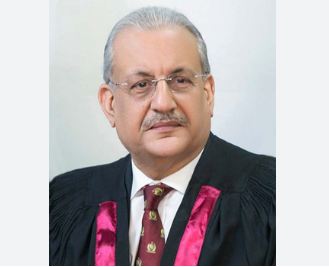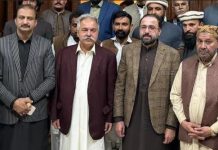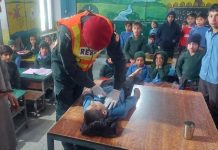ISLAMABAD, MAR 29: Former Senate chairman Raza Rabbani on Friday said the Special Investment Facilitation Council was “infringing on provincial autonomy” by taking up education-related matters.
The statement comes a day after the SIFC convened a meeting to review a new education policy and deliberate on an “education emergency” proposal.
The SIFC was established in June last year under an “economic revival plan” devised by civilian and military leaders to capitalise on “untapped potential in key sectors” and attract foreign direct investment (FDI).
The then-cabinet had approved a number of initiatives, including proposed legislation for amendments to the Investment Board Ordinance to empower the SIFC to facilitate FDI.
In November, the International Monetary Fund (IMF) had raised questions on the SIFC’s creation, advising Pakistan against creating a group of preferred investors or distortions in the country and to ensure transparency and accountability in its business deals.
Last week, newly appointed Education Minister Dr Khalid Maqbool Siddiqui called for imposing an “education emergency” to address the issue of an alarming number of out-of-school children (OOSC) across the country. He had said that a national conference would be organised in collaboration with the SIFC.
On Thursday, the SIFC expressed concerns over the alarming number of OOSC in the country and called for urgent steps to formulate a comprehensive framework and strategy to address the challenge.
The meeting also discussed the proposed new education policy. Currently, the education policy from 2009, which is considered outdated, is in place. On the direction of SIFC, the education ministry has been working to prepare a new education policy.
Today, Rabbani condemned the SIFC taking up the question of OOSC and the education policy.
In a statement, he noted that the council had been created through a notification that did not “allow it to take up education or matters ancillary thereto”.
“Education is a devolved subject from the Government of India Act, 1935 but usurped by the federal government,” the former senator said. “The 18th Amendment, with the deletion of the Concurrent List, from the Fourth Schedule [of] Constitution, 1973, removed any doubts, if any existed,” he added.
“The SIFC is infringing on provincial autonomy,” the PPP leader said, asserting that if any coordination was required on the matter of OOSC, then the appropriate “constitutional forum” was the Council of Common Interests (CCI).
“The federal government can only take up the education policy to the extent of the federal territory and not the provinces,” Rabbani emphasised. “If any coordination in policy is required, the CCI is the constitutional forum and not the SIFC,” he reiterated.
The senior politician further stated, “The federal government must realise that Pakistan is a participatory federation under the Constitution and not a one (single) unit.”
New education policy
Education experts, who are involved in the drafting of the new education policy, had told Dawn that the new policy would focus on education participation, out-of-school children, dropouts, excellence, quality and relevance, and technology deficit.
They also said that new policy should also cover efficient education financing, national standards and strengthening of federal and provincial coordination, skills gaps and employability, and higher education. Sources said that the SIFC in a previous meeting suggested some valuable priority areas to be covered in the new policy.
This includes enrolling out-of-school kids, mainstreaming technical education, a focus on creativity and concept-based learning, uniform education, retaining dropout and out-of-school children into technical streams, inclusive education with special needs and requirements of gifted children, auditing of performance of teachers and schools, and introducing national curriculum into seminaries.
As per the officials, the new national document will focus on power learning and skills through technology, prepare youth for national and international markets, connect schooling and skilling, equip students with a “futuristic mindset” to tackle the problems of the future (climate change, food scarcity), and exams reforms.
The new policy will also focus on school structure, teachers’ career paths, certification, accountability, language, curriculum, assessment, and disaster risk reduction etc.
The National Education Policy 2009 is outdated and also has some anomalies, among them being the budget, which was set at 7pc of the GDP, whereas the country spends less than 2pc of the GDP on education.
During the tenure of the PML-N government from 2013-18, efforts were made to frame a new policy and its draft had also been prepared in 2016, under which nine new chapters were to be added. However, the government could not introduce the policy.
Later, when the PTI came to power, it also announced that a new policy would be introduced but it too failed to do so. However, it managed to introduce an education framework in 2018, which suggested feedback from the public before finalising the education policy 2021, which could not be introduced.
In August 2022, then-education minister Rana Tanveer Hussain told the National Assembly that the National Education Policy 2009 was still intact and work on developing a new policy had been initiated.

















